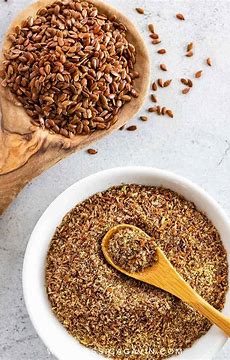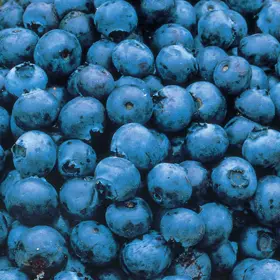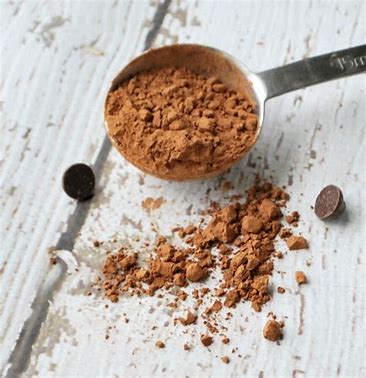Let’s Talk About Flaxseed!

Flaxseed is a surprisingly high source of antioxidants with a variety of health benefits. The flaxseed antioxidant lignin alpha-linolenic acid has been attributed with producing a variety of beneficial actions on the cardiovascular and reproductive systems. For example, flaxseed has shown anti-arrhythmic, anti-atherogenic, anti-hypertensive, and cholesterol-lowering actions in animal and human studies attributed to its alpha-linolenic acid (Parikh & Pierce 2019). Flax’s alpha-linolenic acid also has beneficial effects on the female reproductive system through regulation of dysfunctional reproductive hormones and processes (e.g., polycystic ovarian syndrome, ovarian cancer, ovarian growth, follicle development, reproductive cycles, ovarian cell proliferation and apoptosis, oo- and embryogenesis, and reproduction)(Sirotkin 2023; Emamat et al., 2023).
The antioxidants in flaxseed and flaxseed extracts also have potent anti-inflammatory properties and can reduce the inflammatory compounds NO, 3NT, and NF-κB when administered orally and prophylactically (Chera et al., 2022).
https://pubmed.ncbi.nlm.nih.gov/30562057/
https://www.thieme-connect.com/products/ejournals/pdf/10.1055/a-2013-2966.pdf
https://onlinelibrary.wiley.com/doi/10.1002/ptr.7698
https://www.ncbi.nlm.nih.gov/pmc/articles/PMC9146081/pdf/medicina-58-00582.pdf
Persia et al's 2020 Antioxidant Anti-Inflammatory Cocoa-Flax Smoothie
- 8 oz of dark green leafy vegetables (e.g.,, spinach, baby bok choy, or baby kale).
- 2.25 cups of blueberries.
- 1 banana.
- 1 tablespoon of unsweetened cocoa powder.
- 1 tablespoon of ground flaxseed.
- ½ cup of soy milk (plain or vanilla) or unsweetened vanilla almond milk.
- ½ cup of water.
Health Benefits:
- Reduces inflammation and CRP (inflammatory marker)
- Reduces risk for cardiovascular disease
- Reduces risk for autoimmune diseases
- Reduces risk for COVID-19
- Reduces risk for age-related macular degeneration
- Reduces risk for chronic kidney disease and injury
- Reduces risk for nonallergic asthma
- Reduces risk for COPD
- Reduces risk for hypertension
- Reduces risk for all-cause mortality
Key Players in this Antioxidant Anti-Inflammatory Cocoa Super Smoothie
Flaxseed is a surprisingly high source of antioxidants with a variety of health benefits. The flaxseed antioxidant lignin alpha-linolenic acid has been attributed with producing a variety of beneficial actions on the cardiovascular and reproductive systems. For example, flaxseed has shown anti-arrhythmic, anti-atherogenic, anti-hypertensive, and cholesterol-lowering actions in animal and human studies attributed to its alpha-linolenic acid (Parikh & Pierce 2019). Flax’s alpha-linolenic acid also has beneficial effects on the female reproductive system through regulation of dysfunctional reproductive hormones and processes (e.g., polycystic ovarian syndrome, ovarian cancer, ovarian growth, follicle development, reproductive cycles, ovarian cell proliferation and apoptosis, oo- and embryogenesis, and reproduction)(Sirotkin 2023; Emamat et al., 2023). The antioxidants in flaxseed and flaxseed extracts also have potent anti-inflammatory properties and can reduce the inflammatory compounds NO, 3NT, and NF-κB when administered orally and prophylactically (Chera et al., 2022). https://pubmed.ncbi.nlm.nih.gov/30562057/ https://www.thieme-connect.com/products/ejournals/pdf/10.1055/a-2013-2966.pdf https://onlinelibrary.wiley.com/doi/10.1002/ptr.7698 https://www.ncbi.nlm.nih.gov/pmc/articles/PMC9146081/pdf/medicina-58-00582.pdf
Dark leafy greens contain a variety of beneficial antioxidants and micronutrients. Here, dark leafy greens are used for their beta-carotene, an an antioxidant found in many fruits and dark leafy green vegetables, that is a precursor to another antioxidant, retinol (Vitamin A), and has a strong inverse relationship with C-reactive protein (CRP, an inflammatory marker) and systemic inflammation (Persia et al., 2022; Erlinger et al., 2001; Schultz et al., 2019).
Blueberries are rich sources of a variety of beneficial antioxidants, including flavonoids (mainly anthocyanidins), polyphenols (procyanidin), phenolic acids, pyruvic acid, chlorogenic acid, and many others (Ma et al., 2018). Through these antioxidants (especially polyphenols, anthocyanins, and carotenoids), blueberries have preventative/protective and reductive effects against cancer, obesity, inflammation, aging, degenerative diseases, cognitive decline, metabolic disorders, weight gain, glucose management and diabetes, heart and cardiovascular diseases, atherosclerosis, vision loss, lung problems, and liver impairments AND can improve brain function, bone health, and immunity. (https://www.ncbi.nlm.nih.gov/pmc/articles/PMC6164568/; https://www.ncbi.nlm.nih.gov/pmc/articles/PMC5297730/; https://www.ncbi.nlm.nih.gov/pmc/articles/PMC9146061/; https://www.ncbi.nlm.nih.gov/pmc/articles/PMC7442370/; https://www.ncbi.nlm.nih.gov/pmc/articles/PMC7912458/; https://www.ncbi.nlm.nih.gov/pmc/articles/PMC8147004/)
Bananas are great natural sweeteners but they also have tons of micronutrient benefits! Generally known for their mineral electrolytes. They are great sources of potassium as well as magnesium, phosphorus, calcium, and iron. These are all critical for muscle, heart, brain, and nervous system function. Bananas are also great sources of Vitamin C (which aids the immune system), Vitamins B1, B2, and B6 (important for energy and glucose metabolism), and Vitamin A (the antioxidant Retinol). Bananas are also associated with reduced risk of GI diseases, regulation of carbohydrate metabolism, and weight control (Kidon & Uwineza 2022; Wang et al., 2014; Falcomer et al., 2019). https://www.ncbi.nlm.nih.gov/pmc/articles/PMC9146844/pdf/molecules-27-03049.pdf https://www.mdpi.com/2072-6643/11/6/1222 https://www.researchgate.net/profile/Siyuan-Wang-24/publication/257764749_Effects_of_Anti-browning_Combinations_of_Ascorbic_Acid_Citric_Acid_Nitrogen_and_Carbon_Dioxide_on_the_Quality_of_Banana_Smoothies/links/5702ed9c08ae646a9da87c61/Effects-of-Anti-browning-Combinations-of-Ascorbic-Acid-Citric-Acid-Nitrogen-and-Carbon-Dioxide-on-the-Quality-of-Banana-Smoothies.pdf
Cocoa contains very high amounts of polyphenols (potent anti-inflammatory antioxidants), including the flavonoids catechin, epicatechin, and procyanidin (Katz et al., 2011). A variety of research points to benefits of cocoa’s polyphenols in a variety of different health contexts. The epicatechin can up-regulate nitric oxide production (the active ingredient in Viagra) and relax and dilate vasculature, improving blood flow and overall organ health. The polyphenols (antioxidants) are also associated with direct influence on insulin resistance, reducing risk for diabetes, and have potent anti-inflammatory effects that are associated with cardiovascular benefits. Cocoa polyphenols (antioxidants) have also been found to influence gene expression and immune responses, and can have protective effects against injury and inflammation in skin, nerves, and the nervous system. Studies also find beneficial effects of cocoa on hunger/satiety, cognitive function, and mood. Cocoa is often found and consumed in chocolate products that contain high amounts of sugars and fats that can have adverse health effects and lead to overconsumption and risk of weight gain. However, unsweetened cocoa contains all the beneficial polyphenols without the extra sugars and fats. https://www.ncbi.nlm.nih.gov/pmc/articles/PMC4696435/pdf/ars.2010.3697.pdf





